ARTICLE AD BOX

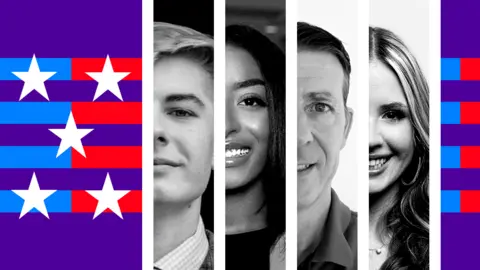 BBC
BBC
For millions of Americans, 5 November will be the first time they vote for president in a US election.
With polling numbers showing a tight race, first-time voters say they're feeling immense pressure and reckoning with a strong partisan divide as they choose between former President Donald Trump and Vice-President Kamala Harris.
The BBC spoke to seven of them across the political spectrum about participating in a US election for the first time.
We start with a voter who is scared by the level of partisanship that now colours US elections.

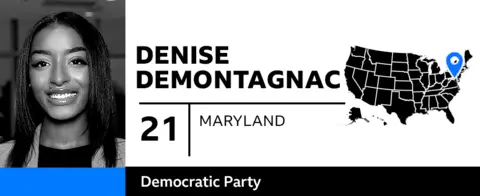
Denise participates in community outreach, urging young people to vote and to back the Harris-Walz ticket.
It's definitely disheartening to see how much hyper-partisanship has increased in the past couple of years. You can watch old presidential debate clips and you can see how cordial the candidates can be, and now you see a flip in politics.
When you see that candidates are enticing their voters to be "it’s either our side or their side" - it’s almost ignorant, it’s not professional in any way and it’s not reflective of who our commander-in-chief is supposed to be.
I'm feeling uneasy because you would think that this would be an easy election. You would think that I wouldn't be scared of the outcome of this election because the outcomes are so night and day, but I am.

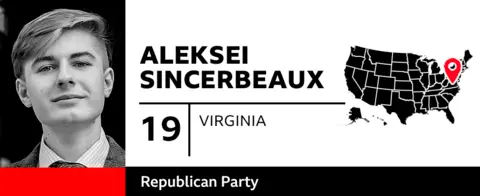
Aleksei started paying attention to politics during the 2020 election and realised the power behind his planned vote for Trump.
I support Trump but I’m kind of dissatisfied with the way his campaign is running things. I feel like Kamala isn’t fit for the job and overall there’s been this feeling of both sides being very party-centric.
Trump was an independent voice in 2016, it felt like he was running against the establishment of both parties.
There’s no independent voice now and that’s demoralising to me. It makes me feel like it’s a return to this chaotic normalcy of two parties who both want to get us into wars and don’t care about the people of this country.

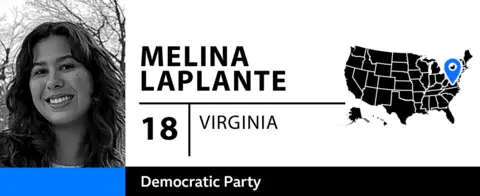
Melina is eager to vote for a candidate who will focus on abortion access and climate change. She feels Harris is her best bet.
Going into the election, it's been very overwhelming. There’s a lot of information coming at me on social media especially.
Prior to Harris being nominated, I was still adamant about voting for Joe Biden because a lot of the rights I feel are important, I felt would be prioritised under a Biden administration. But I'm more proud now to stand behind Harris.
We could get to have our first female president.

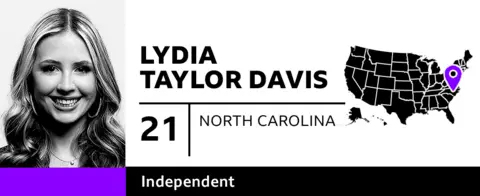
Lydia's number-one issue this election is abortion; she travels the country encouraging young people to vote for anti-abortion candidates and policies.
I can't trust a candidate who refuses to protect the unborn child. If they can't protect preborn children, then I can't trust them to protect any of us.
I'm voting for Trump as he is the most pro-life candidate and the most lives will be saved under him.
This election is very heated and I definitely feel that. Being part of Gen Z, I know we're a target for both candidates. I've been focused on shifting our generation to vote pro-life first.

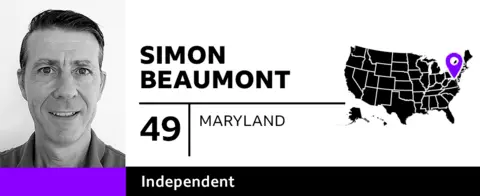
Simon moved to the US from the UK in 2011 and says he previously supported Trump, but wasn't able to vote at the time.
Since the 2016 election, everything seems to be way more divisive.
The one thing I miss about the UK system is the viable third party; right now you have left and right, and there’s very little in the middle.
The divisiveness is pretty upsetting because I don't see the end of it.
At this stage I'm supporting Harris. There's very little about Trump I find appealing, certainly on a personal level and in terms of his policies there's nothing there that makes me think I would vote for him.

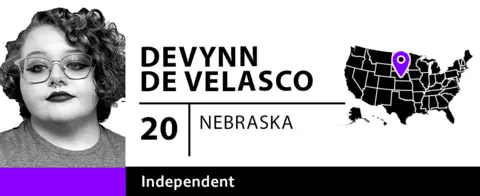
Devynn's interest in politics was sparked by seeing the 6 January riot at the Capitol. It's on her mind as she casts her first ballot.
My family has feelings opposite of mine when it comes to politics but I was always able to discuss things civilly.
Now it feels like we can’t have as many civil conversations and that’s not something I necessarily imagined.
Trump is fuelling this divisiveness and the nastiness is somewhat supported by his policies.
Once he’s no longer within the candidate selection it won’t be as bad.

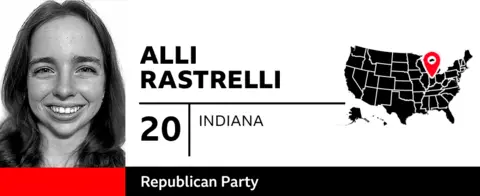
Alli has found this election cycle to be tense, but she feels strongly about casting her first ballot for Trump.
Even bringing up something about the election creates an argument with a lot of people.
I'm voting for Trump in the fall because as much as I agree with his beliefs and policies, his capability of speaking and his charisma also draws me to him.
Both Trump and Vance have something that keeps me engaged with what they’re talking about.
I want my voice to be heard.




North America correspondent Anthony Zurcher makes sense of the race for the White House in his weekly US Election Unspun newsletter.
Readers in the UK can sign up here. Those outside the UK can sign up here.

 7 months ago
28
7 months ago
28








 English (US) ·
English (US) ·